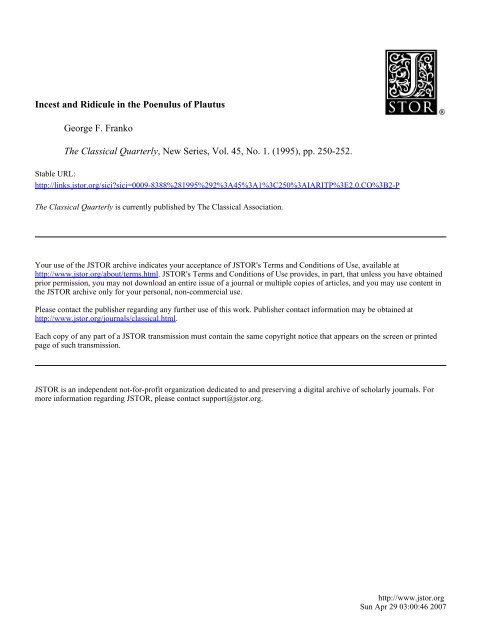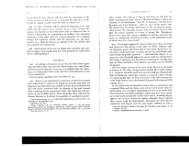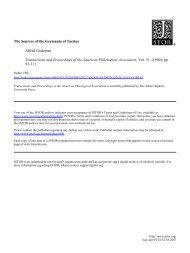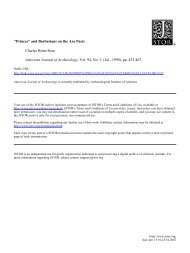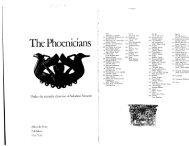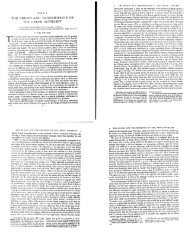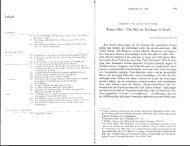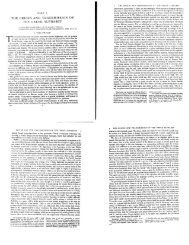Incest and Ridicule in the Poenulus of Plautus ... - Articleserver.info
Incest and Ridicule in the Poenulus of Plautus ... - Articleserver.info
Incest and Ridicule in the Poenulus of Plautus ... - Articleserver.info
Create successful ePaper yourself
Turn your PDF publications into a flip-book with our unique Google optimized e-Paper software.
<strong>Incest</strong> <strong>and</strong> <strong>Ridicule</strong> <strong>in</strong> <strong>the</strong> <strong>Poenulus</strong> <strong>of</strong> <strong>Plautus</strong>George F. FrankoThe Classical Quarterly, New Series, Vol. 45, No. 1. (1995), pp. 250-252.Stable URL:http://l<strong>in</strong>ks.jstor.org/sici?sici=0009-8388%281995%292%3A45%3A1%3C250%3AIARITP%3E2.0.CO%3B2-PThe Classical Quarterly is currently published by The Classical Association.Your use <strong>of</strong> <strong>the</strong> JSTOR archive <strong>in</strong>dicates your acceptance <strong>of</strong> JSTOR's Terms <strong>and</strong> Conditions <strong>of</strong> Use, available athttp://www.jstor.org/about/terms.html. JSTOR's Terms <strong>and</strong> Conditions <strong>of</strong> Use provides, <strong>in</strong> part, that unless you have obta<strong>in</strong>edprior permission, you may not download an entire issue <strong>of</strong> a journal or multiple copies <strong>of</strong> articles, <strong>and</strong> you may use content <strong>in</strong><strong>the</strong> JSTOR archive only for your personal, non-commercial use.Please contact <strong>the</strong> publisher regard<strong>in</strong>g any fur<strong>the</strong>r use <strong>of</strong> this work. Publisher contact <strong>in</strong>formation may be obta<strong>in</strong>ed athttp://www.jstor.org/journals/classical.html.Each copy <strong>of</strong> any part <strong>of</strong> a JSTOR transmission must conta<strong>in</strong> <strong>the</strong> same copyright notice that appears on <strong>the</strong> screen or pr<strong>in</strong>tedpage <strong>of</strong> such transmission.JSTOR is an <strong>in</strong>dependent not-for-pr<strong>of</strong>it organization dedicated to <strong>and</strong> preserv<strong>in</strong>g a digital archive <strong>of</strong> scholarly journals. Formore <strong>in</strong>formation regard<strong>in</strong>g JSTOR, please contact support@jstor.org.http://www.jstor.orgSun Apr 29 03:00:46 2007
250 SHORTER NOTEStimes it marks a change <strong>of</strong> ~peaker;~ eight times <strong>the</strong> words beg<strong>in</strong> a new sentence, <strong>and</strong><strong>in</strong> this case always occur at <strong>the</strong> end <strong>of</strong> <strong>the</strong> l<strong>in</strong>e.1° The fem<strong>in</strong><strong>in</strong>e expression occurs fourtimes; once it marks a change <strong>of</strong> speaker (Mer.770); three times it beg<strong>in</strong>s a newsentence (Am. 1057; Mer. 681, 701). All four examples occur at l<strong>in</strong>e-end." Terencehas six examples <strong>of</strong> <strong>the</strong> mascul<strong>in</strong>e form <strong>and</strong> two <strong>of</strong> <strong>the</strong> fem<strong>in</strong><strong>in</strong>e.Four times a new speaker is marked;12 four times a new sentence.13 Aga<strong>in</strong>, <strong>in</strong> <strong>the</strong>latter case <strong>the</strong> words always appear at l<strong>in</strong>e-end.In sum, <strong>the</strong> expressions ei mihi <strong>and</strong> its extended forms, <strong>in</strong> both <strong>Plautus</strong> <strong>and</strong> Terence,always ei<strong>the</strong>r mark a new speaker, or are placed at <strong>the</strong> end <strong>of</strong> <strong>the</strong> l<strong>in</strong>e <strong>and</strong> mark a newsentence.14Penn State UniversityALLAN KERSHAWlo Cas.574, 848: ante eipers. spat. A; Mer.181, 661, 792; Poen.1379: ante vaepers. spat. AB;Tr<strong>in</strong>. 907; Truc. 342.l1 To <strong>the</strong>se should be added vae miserae mi (Mer.708); this unusual form <strong>of</strong> <strong>the</strong> exclamation,placed mid-l<strong>in</strong>e, marks a new speaker. Terence has <strong>the</strong> form vae misero mi (Hau.250) which also,mid-l<strong>in</strong>e, marks a new speaker.l2 Ad.327; An.302; Hau.234; Hec.605.l3 An.743; Hau.917; Ad.301, 383.l4 Or, if used absolutely as (e.g.) Cas.848, Tr<strong>in</strong>.907, <strong>the</strong> equivalent <strong>of</strong> a sentence; cf. onHec.366 (n. 8 above). I thank <strong>the</strong> anonymous referee <strong>of</strong> helpful criticisms <strong>and</strong> suggestions.INCEST AND RIDICULE IN THE POENULUS OF PLAUTUSReaders <strong>of</strong> <strong>Plautus</strong>' <strong>Poenulus</strong> are struck by <strong>the</strong> generally 'sympa<strong>the</strong>tic' portrayal <strong>of</strong><strong>the</strong> title character Hanno, a portrayal somewhat surpris<strong>in</strong>g to us s<strong>in</strong>ce <strong>the</strong> play wasproduced shortly after <strong>the</strong> Second Punic War.' Contrary to what we might expect,Hanno <strong>the</strong> Carthag<strong>in</strong>ian is nei<strong>the</strong>r villa<strong>in</strong> nor scapegoat, <strong>and</strong> he even exhibits <strong>the</strong>Roman virtue <strong>of</strong> pi eta^.^ However, Hanno's portrayal is not wholly positive, for<strong>Plautus</strong> del<strong>in</strong>eates his character pr<strong>in</strong>cipally by endow<strong>in</strong>g him with <strong>the</strong> negativestereotypes <strong>of</strong> Punic physiognomy, dress, speech, <strong>and</strong> behaviour familiar to hisRoman a~dience.~ Hanno's Punic ethnicity is not merely an <strong>in</strong>cidental matter <strong>of</strong> fact,as it is with his relative Agorastocles, but an essential part <strong>of</strong> his characterization thatserves to isolate him from all <strong>the</strong> o<strong>the</strong>r characters <strong>of</strong> <strong>the</strong> palliata. While some <strong>of</strong>Hanno's vicesdeceit, licentiousness, <strong>and</strong> effem<strong>in</strong>acy-are not exclusive to Carthag<strong>in</strong>ians<strong>and</strong> are shared by o<strong>the</strong>r Greek characters <strong>in</strong> <strong>the</strong>palliata, <strong>the</strong>re is one vicepeculiar to Hanno. In this paper I argue that <strong>Plautus</strong> ridicules Hanno through aFor criteria for dat<strong>in</strong>g, see K. Schutter, Quibus annis Comoediae Plaut<strong>in</strong>ae primum actumsunt quaeritur (Gron<strong>in</strong>gen, 1952), pp. 119-25. For 'sympa<strong>the</strong>tic', see (e.g.) A. S. Gratwick,Cambridge History <strong>of</strong> Classical Literature ii (Cambridge, 1982), p. 94; W. V. Harris, CambridgeAncient History2 viii (Cambridge, 1989), p. 154.Note <strong>the</strong> specific mention <strong>of</strong> pietas at 1137, 1190, 1255, 1277; see also J. A. Hanson,'<strong>Plautus</strong> as a Sourcebook for Roman Religion', TAPA 90 (1959), 48-101, at p. 92.Punic stature mocked at 1309-10, odour at 1313-14, dress at 975-7, 1008, 1121, 1298, 1303;speech parodied at 99C1028; deceit noted at 11 1-13, 10324, 110610, 1124-6, licentiousnessat 1068, 1303, effem<strong>in</strong>acy at 1311. For prevalent stereotypes <strong>of</strong> Carthag<strong>in</strong>ians, see E. Burck,'Das Bild der Karthager <strong>in</strong> der romischen Literatur', Rom und Karthago, ed. J. Vogt (Leipzig,1943), 297-345; M. Dubuisson, 'L'image du Carthag<strong>in</strong>ois dans la litterature lat<strong>in</strong>e', StudiaPhoenicia 2 (1983), 159-67; K. Christ, 'Zum Beurteilung Hannibals', Historia 17 (1968),461-95.
SHORTER NOTES 25 1recurrent <strong>in</strong>s<strong>in</strong>uation <strong>of</strong> <strong>in</strong>cest. The <strong>in</strong>s<strong>in</strong>uation <strong>of</strong> <strong>in</strong>cest has not, to my knowledge,been noted previously, but our text does imply it <strong>in</strong> three conspicuous places.In our very first <strong>in</strong>troduction to Hanno, <strong>the</strong> speaker <strong>of</strong> <strong>the</strong> prologue signals hisovercharged sexual appetite (104-1 1) :sed pater illarum Poenus postquam eas perdiditmari terraque usque quaque quaeritat.ubi quamque <strong>in</strong> urbem est <strong>in</strong>gressus, ilicoomnis meretrices, ubi quisque habitant, <strong>in</strong>venit;dat aurum, ducit noctem, rogitat postibiunde sit, quoiatis, captane an surrepta sit,quo genere gnata, qui parentes fuer<strong>in</strong>t.ita docte atque astu filias quaeritHanno seeks his lost daughters everywhere (1045). Adopt<strong>in</strong>g a deceitful <strong>and</strong>prurient method for his search, he immediately (ilico) seeks out all (omnis) <strong>the</strong>prostitutes upon arrival <strong>in</strong> a town. Thereupon he pays for <strong>the</strong>ir pr<strong>of</strong>essional favours(dat aurum), spends <strong>the</strong> night hav<strong>in</strong>g sex with <strong>the</strong>m (ducit no~tem),~ <strong>and</strong> onlyafterwards asks about <strong>the</strong>ir parentage (rogitat postibi). Thus it is only after hav<strong>in</strong>g<strong>in</strong>tercourse that he <strong>in</strong>quires whe<strong>the</strong>r <strong>the</strong> girls could be his daughters (109-10).Whe<strong>the</strong>r Hanno merely risks <strong>in</strong>cest or actively seeks it, <strong>the</strong> audience's first piece <strong>of</strong><strong>in</strong>formation about him reveals that he is crafty (docte atque astu) <strong>and</strong> so lecherous asto countenance sleep<strong>in</strong>g with his daughters.The audience must wait over 1200 l<strong>in</strong>es to reach <strong>the</strong> emotional climax <strong>of</strong> <strong>the</strong> play:Hanno's discovery <strong>of</strong> his daughters. When Hanno arrives on stage he learns, by afortuitous meet<strong>in</strong>g with Agorastocles, that his daughters are near at h<strong>and</strong>; thus, heneed no longer follow his normal method <strong>of</strong> search<strong>in</strong>g among courtesans. Yet whenHanno sees his daughters, he does not immediately hail <strong>and</strong> approach <strong>the</strong>m as wemight expect an elated fa<strong>the</strong>r would do; ra<strong>the</strong>r, he approaches <strong>the</strong>m as a customersolicit<strong>in</strong>g prostitutes (1217-1 8) :Hanno: gaudio ero vobis. Adelphasiurn: at edepol nos voluptati tibi. Hanno: libertatique. Adelphasium: istoc pretio tuas nos facile feceris. ('I'll br<strong>in</strong>g you joy.' 'But we'll br<strong>in</strong>g you pleasure.' 'And freedom.' 'At that price you'll easily have your way with us.') We have only <strong>the</strong> script, <strong>and</strong> thus cannot know how lewdly <strong>the</strong> Roman actors playedthis scene, but <strong>the</strong> sense allows us to envision flirtatious physical contact, <strong>and</strong> thatwould imply <strong>in</strong>cest. The erotic tone <strong>of</strong> <strong>the</strong>se l<strong>in</strong>es has seemed out <strong>of</strong> place to somereaders, <strong>in</strong>clud<strong>in</strong>g Leo, who a<strong>the</strong>tized <strong>the</strong>m <strong>in</strong> his <strong>in</strong>fluential edition; however, <strong>the</strong>l<strong>in</strong>es should be reta<strong>in</strong>ed, for Hanno behaves precisely as <strong>the</strong> prologue foretold, <strong>and</strong>he himself makes this explicit with an aside at 1223: 'sed ut astu sum adgressus adea~'.~ Fur<strong>the</strong>rmore, this exchange befits not only Hanno's character, but also hisAll quotations <strong>of</strong> <strong>Plautus</strong> taken from Ernout's Bude edition.Cf. Truc.49,where noctes ducit clearly means to spend <strong>the</strong> night with a scorturn.Gratwick correctly notes <strong>the</strong> fulfilment <strong>of</strong> <strong>the</strong> prologue <strong>and</strong> shows that <strong>the</strong>se l<strong>in</strong>es should bereta<strong>in</strong>ed (The <strong>Poenulus</strong> <strong>of</strong> <strong>Plautus</strong> <strong>and</strong> Its Attic Orig<strong>in</strong>al, unpublished Oxford D. Phil., 1969, pp.212-13). The source for <strong>the</strong> suspicion <strong>of</strong> <strong>in</strong>terpolation is <strong>the</strong> comment <strong>of</strong> Agorastocles at 1221-2:'ut pudice verba fecit, cogitate et commode! ut modeste orationem praebuit!' Clearly, thisremark is ironic, ei<strong>the</strong>r a tongue-<strong>in</strong>-cheek joke or else <strong>the</strong> babbl<strong>in</strong>g typical <strong>of</strong> an adulescens amansbl<strong>in</strong>ded by love (cf. Gratwick). The jest<strong>in</strong>g nature <strong>of</strong> Agorastocles' remark is apparent from1219-20, where he scurrilously compares himself to Jupiter.
252 SHORTER NOTESdaughters', for <strong>the</strong> girls are prostitutes-<strong>in</strong>-tra<strong>in</strong><strong>in</strong>g return<strong>in</strong>g from a festival <strong>of</strong>meretrices at <strong>the</strong> temple <strong>of</strong> Venus. <strong>Plautus</strong> <strong>in</strong>jects this long-anticipated encounter withtension, humour, <strong>and</strong> a h<strong>in</strong>t <strong>of</strong> <strong>in</strong>cest by mak<strong>in</strong>g Hanno <strong>and</strong> his daughters persist <strong>in</strong><strong>the</strong>ir practised roles <strong>of</strong> customer <strong>and</strong> prostitutes ra<strong>the</strong>r than adopt <strong>the</strong>ir new roles <strong>of</strong>fa<strong>the</strong>r <strong>and</strong> daughters.At last <strong>the</strong> daughters recognize Hanno <strong>and</strong> <strong>the</strong> joyful reunion ensues. As <strong>the</strong>ycelebrate, <strong>the</strong> soldier Antamoenides, paramour <strong>of</strong> <strong>the</strong> younger daughter, approaches<strong>in</strong> a rage. While both daughters hug Hanno <strong>in</strong> fear, <strong>Plautus</strong> leaves ambiguous <strong>the</strong>motivation for Hanno's embrace, for Antamoenides f<strong>in</strong>ds <strong>the</strong>m entw<strong>in</strong>ed <strong>in</strong> such apromiscuous way that he mistakes Hanno for a rival lover: 'quid hoc estconduplicationis? quae haec est congem<strong>in</strong>atio?' (1297). We should note that <strong>Plautus</strong>uses conduplicatio elsewhere as <strong>the</strong> equivalent <strong>of</strong> mak<strong>in</strong>g <strong>the</strong> beast with two backs.7Apparently Hanno does not give a paternal hug, but an embrace passionate enoughto generate a misunderst<strong>and</strong><strong>in</strong>g: 'Antamoenides: tune hic amator audes esse, hallexviri, / aut contrectare quod mares hom<strong>in</strong>es amant?'s Although we cannot know <strong>in</strong>exactly what manner <strong>the</strong> actors embraced, <strong>the</strong>y necessarily hugged <strong>in</strong> such a way that<strong>the</strong> soldier, <strong>and</strong> <strong>the</strong>reby <strong>the</strong> audience, could have perceived <strong>the</strong>m as lovers;Antamoenides' outburst suggests that Hanno's h<strong>and</strong>s grasped what a fa<strong>the</strong>r's shouldnot.We should not be shocked that <strong>Plautus</strong> <strong>in</strong>s<strong>in</strong>uates Punic <strong>in</strong>cest on <strong>the</strong> Roman stage.First, <strong>Plautus</strong> is generally not shy about sexual matters; <strong>in</strong> Bacchides, for example,sons <strong>and</strong> fa<strong>the</strong>rs share <strong>the</strong> same courtesans, <strong>and</strong> such action is permissible because itall takes place <strong>in</strong> <strong>the</strong> Greek East. Second, characters <strong>in</strong> New Comedy <strong>of</strong>ten comeperilously close to committ<strong>in</strong>g <strong>in</strong>cest. However, <strong>in</strong>cest is never consummated, <strong>and</strong>approached only ~nwitt<strong>in</strong>gly.~ Thus, while it is not unusual to raise <strong>the</strong> spectre <strong>of</strong><strong>in</strong>cest <strong>in</strong> <strong>the</strong> palliata, it is highly unusual to have a character know<strong>in</strong>gly pursue it.Third, <strong>and</strong> most significantly, Hanno is not a typical character <strong>of</strong> New Comedy.Hanno is Punic, an alien to <strong>the</strong> Greek world depicted <strong>in</strong> <strong>the</strong> palliata, <strong>and</strong> his foreignhabits are thus targets for ridicule.1°Holl<strong>in</strong>s College, Virg<strong>in</strong>iaGEORGE F. FRANK0Pseud.1259-61: 'nam ubi amans complexust amantem, ubi labra ad labella adiungit, / ubialter alterum bil<strong>in</strong>gui manifesto <strong>in</strong>ter se prehendunt, / ubi mamma mammicula opprimitur, aut,si lubet, corpora conduplicant .. .'.131G11; for contrectare ('fondle'), cf. Poen. 698; see also 1301, 1303.E.g. <strong>in</strong> Epidicus, Stratippocles purchases his half-sister Telestis but <strong>the</strong>n learns her identity(649: 'quid? ego mod0 amator sum huic frater factus?'); <strong>in</strong> Curculio, <strong>the</strong> soldierTherapontigonus unknow<strong>in</strong>gly tries to purchase his lost sister Planesium. Note, however,Aristophanes Wasps 607-9, where Philokleon enjoys a French kiss from his daughter, who isfish<strong>in</strong>g obols out <strong>of</strong> his mouth with her tongue. A tension stemm<strong>in</strong>g from <strong>the</strong> possibility <strong>of</strong>sleep<strong>in</strong>g with long-lost members <strong>of</strong> <strong>the</strong> nuclear family is remote for us, <strong>and</strong> <strong>the</strong> chances <strong>of</strong> afa<strong>the</strong>r sleep<strong>in</strong>g with his daughter exposed long ago may seem to us impossibly small; however,<strong>the</strong> recurrence <strong>of</strong> this <strong>the</strong>me <strong>in</strong> New Comedy may <strong>in</strong>dicate a real tension for <strong>the</strong> Romans; seeJ. Boswell, The K<strong>in</strong>dness <strong>of</strong> Strangers (New York, 1988), pp. 95-137.lo I wish to thank <strong>the</strong> editors <strong>and</strong> referee for <strong>the</strong>ir helpful remarks, as well as those who readdrafts <strong>of</strong> this paper: J. Zetzel, R. Mondi, A. Laidlaw, <strong>and</strong> P. Fosl.


